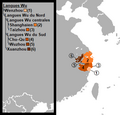File:Chinois Wu.png

Original file (1,495 × 832 pixels, file size: 53 KB, MIME type: image/png)
Captions
Captions
Summary edit
| DescriptionChinois Wu.png |
Français : Le chinois wu (ou encore wu ou wugniu) est un ensemble de langues/dialectes chinois(es) parlé(e)s à Shanghai et dans les provinces de Zhejiang, Jiangsu, Anhui et Jiangxi, en Chine continentale. Leur nombre de locuteurs total est estimé à 81 millions (2018) par Ethnologue. Néanmoins, ces variétés sont sous pression face au mandarin. Il s'agit de la première langue non-officielle du monde, avant le pendjabi (une langue indo-aryenne). Cet ensemble comprend parfois le chinois huizhou, mais ce n'est pas le cas sur cette carte. Le wu aurait aussi subi des influences du vieux yue (une ancienne langue taï-kadaï, à ne pas confondre avec le sous-groupe des langues chinoises actuel). Le wu se serait séparé du moyen chinois ancien au VIIème siècle, avec le xiang et le yue, remplaçant ainsi le vieux wu, une variété du vieux chinois dont le wu moderne ne descend pas, et les dialectes de ce groupes se seraient fragmentés au XVème siècle.
Sources des informations : Wikipédia (cf. 1er, 2e et 3e, 4e et 5e lien) ; Ethnologue (6e lien) ; The Dragon Historian (7ème lien) ; Commons (8ème lien) ; Ethnologue, languages of the world (9ème lien) Fond de carte : Richaringan (10ème lien) Sources : https://fr.wikipedia.org/wiki/Wu_(langue) https://en.wikipedia.org/wiki/Wu_Chinese https://en.wikipedia.org/wiki/Taihu_Wu https://en.wikipedia.org/wiki/Wenzhounese https://en.wikipedia.org/wiki/Sinitic_languages https://www.ethnologue.com/language/wuu https://www.youtube.com/watch?v=zDiCqMgTm1Y&list=PLr5s1UAYAcAJkZ5LKK2X8iBPDRZ_fvf_a&index=9 https://commons.wikimedia.org/wiki/Category:Linguistic_maps_of_the_Wu_language https://www.ethnologue.com/language/wuu https://commons.wikimedia.org/wiki/File:Mod%C3%A8le_carte_Richaringan_-_Sud_de_la_Chine.pngEnglish: Wu Chinese is a group of Chinese languages/dialects spoken in Shanghai, Zhejiang, Jiangsu, Anhui and Jiangxi provinces, in Mainland China. The total number of speaker seemed to be 81 millon in 2018 (according to Ethnologue). However, those varieties are under pressure from Mandarin. It is the first non-official language in the world, before Penjabi (an Indo-Aryan language). It sometimes includes Huizhou Chinese, but it is not the case on this map. Wu languages seem to have been influenced by Old Yue (an ancient Tai-Kadai language, not the Chinese language group). The Wu varieties separated from Early Middle Chinese during the 7th century, along with Xiang and Yue, replacing Old Wu, an Old Chinese variety from which Modern Wu does not descend, and Proto-Wu separated during the 15th century.
Sources : See links above |
| Date | |
| Source | Own work |
| Author | Richaringan |
| Other versions |
|
Licensing edit
- You are free:
- to share – to copy, distribute and transmit the work
- to remix – to adapt the work
- Under the following conditions:
- attribution – You must give appropriate credit, provide a link to the license, and indicate if changes were made. You may do so in any reasonable manner, but not in any way that suggests the licensor endorses you or your use.
- share alike – If you remix, transform, or build upon the material, you must distribute your contributions under the same or compatible license as the original.
File history
Click on a date/time to view the file as it appeared at that time.
| Date/Time | Thumbnail | Dimensions | User | Comment | |
|---|---|---|---|---|---|
| current | 16:41, 29 August 2022 |  | 1,495 × 832 (53 KB) | Richaringan (talk | contribs) | Refonte graphique |
| 13:12, 24 April 2022 |  | 395 × 380 (12 KB) | Richaringan (talk | contribs) | Uploaded own work with UploadWizard |
You cannot overwrite this file.
File usage on Commons
The following 5 pages use this file:
File usage on other wikis
The following other wikis use this file:
- Usage on fr.wikipedia.org
Metadata
This file contains additional information such as Exif metadata which may have been added by the digital camera, scanner, or software program used to create or digitize it. If the file has been modified from its original state, some details such as the timestamp may not fully reflect those of the original file. The timestamp is only as accurate as the clock in the camera, and it may be completely wrong.
| Horizontal resolution | 47.24 dpc |
|---|---|
| Vertical resolution | 47.24 dpc |
